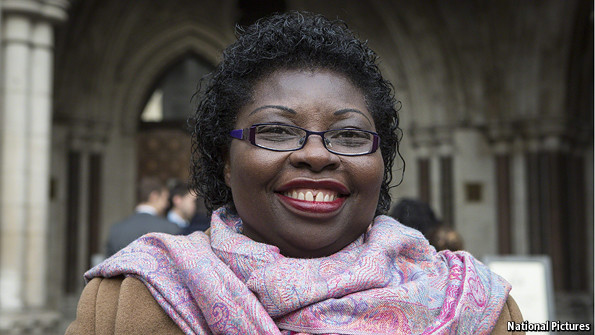Welcome to DU!
The truly grassroots left-of-center political community where regular people, not algorithms, drive the discussions and set the standards.
Join the community:
Create a free account
Support DU (and get rid of ads!):
Become a Star Member
Latest Breaking News
General Discussion
The DU Lounge
All Forums
Issue Forums
Culture Forums
Alliance Forums
Region Forums
Support Forums
Help & Search
Religion
Related: About this forumShifting entitlements
http://www.economist.com/blogs/erasmus/2013/12/employment-rights-and-religionDec 12th 2013, 17:04 by B.C.

SHOULD employees be allowed to opt out of working on certain days of the week because that is required by their religion or conscience? In Britain, that emotive question is surrounded by a dense thicket of legal arguments over the various principles which have been set down by national and European Union law as well as by the European Court of Human Rights.
And in that arcane world, something peculiar is going on. In a landmark case, a devout Christian woman who refused to work Sunday shifts at a south London children's home, and left after disciplinary proceedings, has suffered her third successive defeat. The court of appeal has upheld the opinion of two employment tribunals that the local council was acting reasonably in expecting Celestina Mba (pictured) to work on Sundays. And yet advocates of Christian rights are still claiming that the outcome was a tactical success for their cause.
How can that be? To see what the religious campaigners are talking about, you have to look at the fine print of the court of appeal's judgement. While endorsing the decision in favour of Mrs Mba's employers, all three appeal judges acknowledged that the earlier tribunal hearings had been guilty of sloppiness in their legal reasoning.
How so? Let's begin at the beginning. It was generally accepted that Mrs Mba did suffer a sort of "indirect discrimination"—in the sense that she fell foul of a rule or practice which could put certain categories of people at a a disadvantage. But "indirect discrimination" can be justified if it can be shown to be "a proportionate means of achieving a legitimate aim." So the key question was whether the council was acting in a "proportionate" way when it insisted that it could not assure proper supervision for the children in its care unless Mrs Mba did her share of Sundays.
more at link
InfoView thread info, including edit history
TrashPut this thread in your Trash Can (My DU » Trash Can)
BookmarkAdd this thread to your Bookmarks (My DU » Bookmarks)
1 replies, 604 views
ShareGet links to this post and/or share on social media
AlertAlert this post for a rule violation
PowersThere are no powers you can use on this post
EditCannot edit other people's posts
ReplyReply to this post
EditCannot edit other people's posts
Rec (1)
ReplyReply to this post
1 replies
 = new reply since forum marked as read
Highlight:
NoneDon't highlight anything
5 newestHighlight 5 most recent replies
= new reply since forum marked as read
Highlight:
NoneDon't highlight anything
5 newestHighlight 5 most recent replies
Shifting entitlements (Original Post)
cbayer
Dec 2013
OP
rug
(82,333 posts)1. That's an interesting approach.
After taking evidence from a well-known Anglican prelate, the Pakistani-born Bishop Michael Nazir-Ali, the first-stage tribunal opined that refusal to work on Sundays was "not a core belief" of Christianity. But as I have mentioned in a previous posting, the idea that courts can adjudicate a religion's beliefs is a contentious one, especially so since the ECHR ruling last January in favour of a woman who wanted to wear a small cross along with her British Airways uniform. That ECHR ruling affirmed an individualistic approach to religious freedom, implying that the woman's feelings and conscience were more important than a court opinion over the mandates of faith. The ECHR drew on Article 9 of the European Convention on Human Rights which asserts the individual's right to manifest a religion.
So how much difference, exactly, should the ECHR ruling and Article 9 make to the way people like Mrs Mba are treated? A substantial difference, according to two out of the three court of appeal judges. Simplifying their argument only a little, those two judges thought the freedom of individual conscience mandated by Article 9, and reaffirmed by the Strasbourg court, should henceforth have a significant effect on the way that alleged acts of discrimination and their "proportionality" are assessed. In Mrs Mba's case, the appeal judges were satisifed on balance that the children's home had an overwhelming need to assure round-the-clock coverage. But by stressing the need to take the European Convention into account, they seemed to give heart to future claimants in similar cases.
So how much difference, exactly, should the ECHR ruling and Article 9 make to the way people like Mrs Mba are treated? A substantial difference, according to two out of the three court of appeal judges. Simplifying their argument only a little, those two judges thought the freedom of individual conscience mandated by Article 9, and reaffirmed by the Strasbourg court, should henceforth have a significant effect on the way that alleged acts of discrimination and their "proportionality" are assessed. In Mrs Mba's case, the appeal judges were satisifed on balance that the children's home had an overwhelming need to assure round-the-clock coverage. But by stressing the need to take the European Convention into account, they seemed to give heart to future claimants in similar cases.
Aside from the fact that the article doesn't mention if she's Anglican, which is the only the Bishop's testimony would be relevant, the ruling does appear to strengthen freedom of conscience across the board.